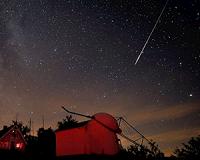 |
Huntsville, Ala. (UPI) Aug 10, 2010 The annual Perseid meteor shower, which peaks this week, announced itself with a bright, streaking fireball over Alabama, observers said. NASA officials said a meteor just 1 inch wide lit up the sky while streaking through the Earth's atmosphere last week, The Christian Science Monitor reported Tuesday. Sky-watching cameras operated by NASA's Marshall Space Flight Center in Huntsville, Ala., captured the fireball, the online newspaper said. "It's a very good start to this year's Perseid meteor shower, which will peak on the night of Aug. 12-13 between midnight and dawn," explained NASA spokeswoman Janet Anderson in a statement from the center. NASA said the meteor qualified as a so-called Earth-grazing meteor, a space rock that enters the planet's atmosphere at a low angle, from the point of view of a sky watcher, and appears to flame slowly and dramatically along the horizon. The Perseid shower is an annual event in mid-August when Earth passes close to the orbit of the Comet Swift-Tuttle. Material left behind by the comet slams into the Earth's atmosphere at about 37 miles per second, creating a regular show of "shooting stars." Comet Swift-Tuttle was discovered in 1862 and most recently observed in 1992. It takes about 130 years to orbit the sun.
Share This Article With Planet Earth
Related Links Asteroid and Comet Impact Danger To Earth - News and Science
 Perseid Meteors Return: Viewing Conditions Excellent
Perseid Meteors Return: Viewing Conditions ExcellentPalm Coast FL (SPX) Aug 10, 2010 The Perseid meteor shower, an annual celestial event beloved by millions of skywatchers around the world, returns to the night sky this week. And because the Moon is new, there will be no moonlight to hinder the view. Sky and Telescope magazine predicts that the Perseid shower will be at or near its peak late on Wednesday night (the night of August 11-12) and, probably even better, late on ... read more |
|
| The content herein, unless otherwise known to be public domain, are Copyright 1995-2010 - SpaceDaily. AFP and UPI Wire Stories are copyright Agence France-Presse and United Press International. ESA Portal Reports are copyright European Space Agency. All NASA sourced material is public domain. Additional copyrights may apply in whole or part to other bona fide parties. Advertising does not imply endorsement,agreement or approval of any opinions, statements or information provided by SpaceDaily on any Web page published or hosted by SpaceDaily. Privacy Statement |